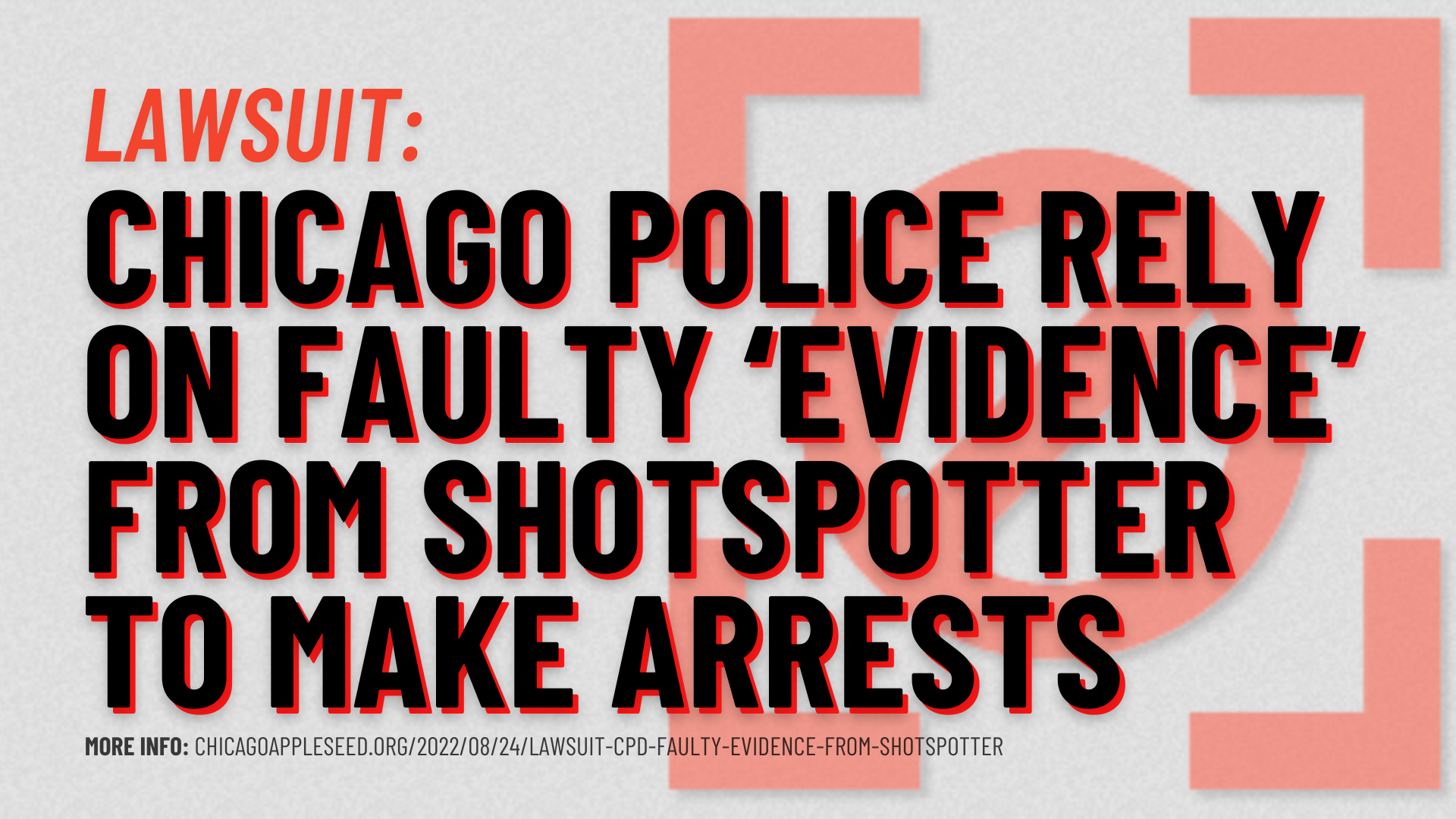Lawsuit: Chicago Police Department Relies on Faulty ‘Evidence’ from ShotSpotter to Make Arrests
On July 21, 2022, attorneys from Northwestern University’s MacArthur Justice Center filed a federal lawsuit on behalf of Michael Williams, Daniel Ortiz, and Lucy Parsons Labs against the City of Chicago, Chicago Police Department (CPD) Superintendent David Brown, and several CPD officers. The lawsuit, Williams v. City of Chicago, emphasizes that the City’s reliance on faulty audio-surveillance technology (known as ShotSpotter) as a tool to monitor and arrest people allegedly using guns is a civil rights abuse. Chicago Appleseed Center for Fair Courts agrees with the local activists and youth leaders who are calling on the City of Chicago to “dump ShotSpotter” and is hopeful that this lawsuit will push the City in the right direction.
ShotSpotter’s “Precision Policing Platform” is a surveillance technology that uses outdoor microphones, usually attached to street signs or streetlights, to monitor noises in certain neighborhoods. The platform, which purports to be “highly data-driven” and include “community protections and engagement opportunities to help improve police-community relations,” has proven to be and do the opposite. For years, the #StopShotSpotter Coalition has shed light on how the technology, which sends alerts of supposed gunfire directly to CPD, is faulty in its detection methods and racist in its implementation.
ShotSpotter devices are primarily located on the Southside and Westside of Chicago, which are primarily Black and Latine communities, and have been known to fail in distinguishing noises — often confusing fireworks or cars backfiring as gunfire and putting local residents in danger of hostile encounters with police.
Several data analyses have found that “more than 90% of ShotSpotter alerts lead police to find no evidence to corroborate gunfire when police arrive at the location ShotSpotter sent them: no shooting, no shell casings, no victims, no witnesses, no guns recovered.” According to the Chicago Office of the Inspector General, more than 2,400 stop-and-frisks by CPD were linked to ShotSpotter in an 18-month period. Still, the City of Chicago and the Chicago Police Department insist on using ShotSpotter as a technique to surveil communities and incarcerate residents. In 2020, the City renewed the over $33 million contract with ShotSpotter for another two years – without any public input or discussions of the concerning data. The ShotSpotter contract is a waste of citizens’ tax dollars and puts Chicago residents in unnecessarily dangerous situations.
The City only deploys ShotSpotter across the South and West sides of Chicago, blanketing ShotSpotter sensors over the twelve police districts with the highest proportion of Black and Latinx residents and the lowest proportion of White residents. 80% of Black Chicagoans and 65% of Latinx Chicagoans live under ShotSpotter’s shadow, compared to only 30% of White Chicagoans. Unfounded ShotSpotter deployments amounted to more than one in twelve of the top-priority police dispatches in the South and West Side police districts where ShotSpotter is active.
MacArthur Justice Center
In attempt to fight back against this faulty and racist technology, MacArthur Justice Center filed this class action lawsuit against the City of Chicago to “end the unconstitutional and discriminatory use of ShotSpotter” and “to end unconstitutional ShotSpotter stop-and-frisks.” Williams v. City of Chicago represents the people who, like Michael Williams – the lawsuit’s namesake – were incorrectly and illegally arrested and detained based on ShotSpotter ‘evidence.’ Sixty-three-year-old Michael Williams spent nearly a year in Cook County Jail after CPD “falsely accused him of murder based solely on an unreliable ShotSpotter alert” and Dennis Ortiz spent a night in jail before charges were dismissed after being “illegally stopped, frisked, handcuffed, interrogated, and ultimately arrested outside of the laundromat” while doing his children’s laundry.
ShotSpotter harms our communities and the Chicago Police Department should stop using it immediately.
Chicago Appleseed Center for Fair Courts is proud to be a supporter of the #StopShotSpotter Coalition and work toward the abolition of unethical police surveillance — particularly through those methods which are proven ineffective through data and harm Black and Brown communities disproportionately. We will continue to monitor the progress of Williams v. City of Chicago here.
If you or someone you know believes you may have been stopped by CPD because of a ShotSpotter alert, please contact the MacArthur Justice Center here.

